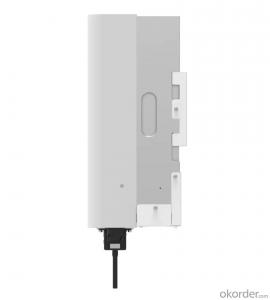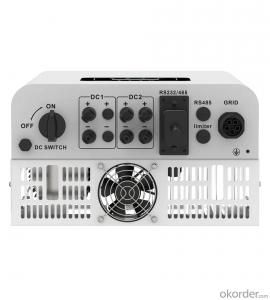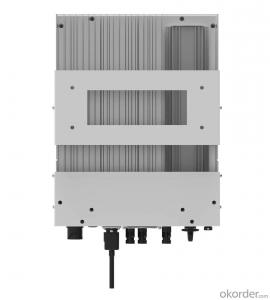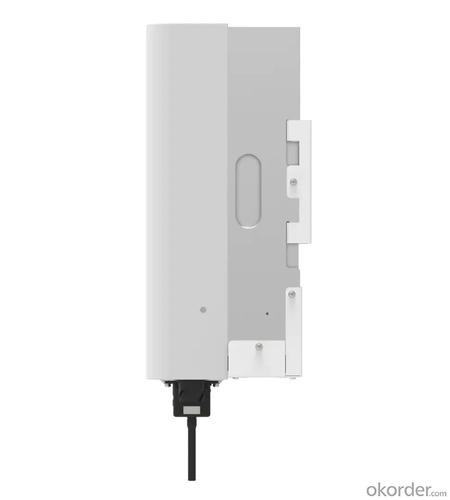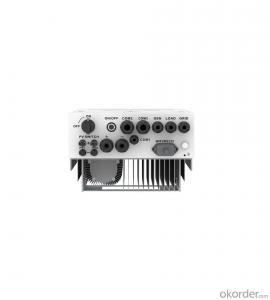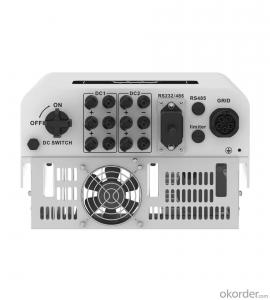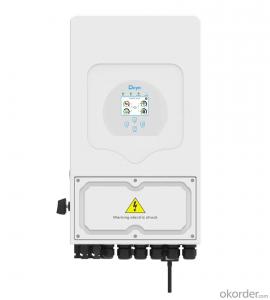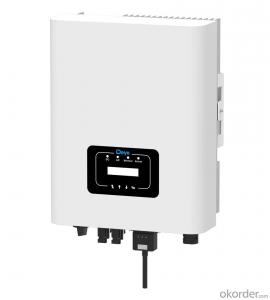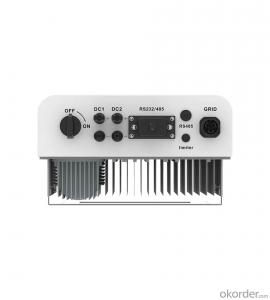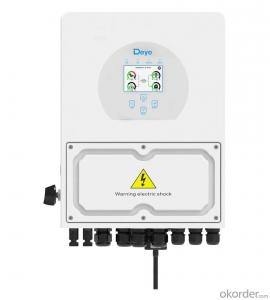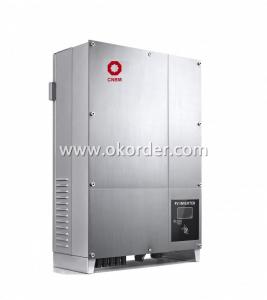Su Kam Solar Inverter - Sun-6/8k-g03-lv | 6-8kW | Three Phase | 2 MPPT | Low Voltage | 127/220VAC
- Loading Port:
- Ningbo
- Payment Terms:
- TT OR LC
- Min Order Qty:
- 100 pc
- Supply Capability:
- 5000 pc/month
OKorder Service Pledge
OKorder Financial Service
You Might Also Like
Specification
| Technical Data | ||||
| Model | SUN-6K-G03-LV | SUN-8K-G03-LV | ||
| Input Side | ||||
| Max. DC Input Power (kW) | 7.8 | 10.4 | ||
| Max. DC Input Voltage (V) | 800 | |||
| Start-up DC Input Voltage (V) | 250 | |||
| MPPT Operating Range (V) | 200~700 | |||
| Max. DC Input Current (A) | 13+13 | 13+26 | ||
| Max. Short Circuit Current (A) | 19.5+19.5 | 19.5+39 | ||
| Number of MPPT / Strings per MPPT | 2/1 | 2/1+2 | ||
| Output Side | ||||
| Rated Output Power (kW) | 6 | 8 | ||
| Max. Active Power (kW) | 6.6 | 8.8 | ||
| Nominal Output Voltage / Range (V) | 3L/N/PE 127/0.85Un-1.1Un,220 /0.85Un-1.1Un (this may vary with grid standards) | |||
| Rated Grid Frequency (Hz) | 60 / 50 (Optional) | |||
| Operating Phase | Three phase | |||
| Rated AC Grid Output Current (A) | 15.7 | 21 | ||
| Max. AC Output Current (A) | 17.3 | 23.1 | ||
| Output Power Factor | 0.8 leading to 0.8 lagging | |||
| Grid Current THD | <3%< span=""> | |||
| DC Injection Current (mA) | <0.5%< span=""> | |||
| Grid Frequency Range | 57~62 | |||
| Efficiency | ||||
| Max. Efficiency | 98.3% | 98.5% | ||
| Euro Efficiency | 97.5% | |||
| MPPT Efficiency | >99% | |||
| Protection | ||||
| DC Reverse-Polarity Protection | Yes | |||
| AC Short Circuit Protection | Yes | |||
| AC Output Overcurrent Protection | Yes | |||
| Output Overvoltage Protection | Yes | |||
| Insulation Resistance Protection | Yes | |||
| Ground Fault Monitoring | Yes | |||
| Anti-islanding Protection | Yes | |||
| Temperature Protection | Yes | |||
| Integrated DC Switch | Yes | |||
| Remote software upload | Yes | |||
| Remote change of operating parameters | Yes | |||
| Surge protection | DC Type II / AC Type II | |||
| General Data | ||||
| Size (mm) | 330W×457H×205D | 333W×472H×202D | ||
| Weight (kg) | 11 | 15 | ||
| Topology | Transformerless | |||
| Internal Consumption | <1W (Night) | |||
| Running Temperature | -25~65℃, >45℃ derating | |||
| Ingress Protection | IP65 | |||
| Noise Emission (Typical) | <25 dB | <40 dB | ||
| Cooling Concept | Natural cooling | Smart cooling | ||
| Max. Operating Altitude Without Derating | 2000m | |||
| Warranty | 5 years | |||
| Grid Connection Standard | CEI 0-21, VDE-AR-N 4105, NRS 097, IEC 62116, IEC 61727, G99, G98, VDE 0126-1-1, RD 1699, C10-11 | |||
| Operating Surroundings Humidity | 0-100% | |||
| Safety EMC / Standard | IEC/EN 61000-6-1/2/3/4, IEC/EN 62109-1, IEC/EN 62109-2 | |||
| Features | ||||
| DC Connection | MC-4 mateable | |||
| AC Connection | IP65 rated plug | |||
| Display | LCD160 | |||
| Interface | 2 RS485/RS232/Wifi/LAN | |||
127/220Vac and 60Hz, three phase system
2 MPP tracker, Max. efficiency up to 98.5%
Zero export application, VSG application
String intelligent monitoring (optional)
Wide output voltage range
Anti-PID function (Optional)
This series inverter is specially designed for 127/220Vac three-phase system, especially suits for South American areas. With compactness design, easy to install and operate. It supports wide AC output voltage to ensure longer working hour, improving your economic benefits.
- Q: Can a solar inverter be used with different types of backup power sources?
- Yes, a solar inverter can be used with different types of backup power sources. Solar inverters are designed to convert the direct current (DC) generated by solar panels into alternating current (AC) that can be used to power electrical devices. They can be integrated with various backup power sources such as batteries, generators, or the grid. This flexibility allows for a reliable and uninterrupted power supply, utilizing solar energy as the primary source while seamlessly switching to alternative power sources when needed.
- Q: How does a solar inverter handle variations in battery charge levels?
- A solar inverter manages variations in battery charge levels by continuously monitoring the battery voltage and adjusting the charging and discharging rates accordingly. It optimizes the power flow and ensures that the battery is neither overcharged nor depleted, thus maximizing its lifespan and efficiency.
- Q: Can a solar inverter be used in commercial or industrial applications?
- Yes, a solar inverter can be used in commercial or industrial applications. In fact, they are commonly utilized in these settings to convert the direct current (DC) generated by solar panels into alternating current (AC) that can power various electrical equipment and systems. Solar inverters enable efficient and reliable integration of solar energy into commercial and industrial operations, contributing to cost savings and environmental sustainability.
- Q: What is the maximum power rating of a solar inverter?
- The maximum power rating of a solar inverter typically depends on its size and capacity, but it can range from a few hundred watts to several megawatts.
- Q: Can a solar inverter be used with both AC and DC power sources?
- No, a solar inverter is designed to convert DC (direct current) power generated by solar panels into AC (alternating current) power for use in the electrical grid or to power AC appliances. It is not intended to convert AC power into DC power.
- Q: What is the maximum operating altitude for a solar inverter?
- The maximum operating altitude for a solar inverter typically varies depending on the specific model and manufacturer. However, on average, most solar inverters can operate effectively at altitudes up to 4,000 meters (13,123 feet) above sea level. It is important to consult the manufacturer's specifications or user manual for the precise altitude limitations of a particular solar inverter.
- Q: Can a solar inverter be used for commercial-scale solar installations?
- Yes, a solar inverter can be used for commercial-scale solar installations. In fact, commercial-scale solar installations often require multiple solar inverters to convert the DC power generated by the solar panels into usable AC power for commercial use. These inverters are designed to handle the higher power output and voltage levels typically found in larger solar installations.
- Q: Can a solar inverter be used in a mobile or portable solar power system?
- Yes, a solar inverter can be used in a mobile or portable solar power system. A solar inverter is responsible for converting the direct current (DC) generated by the solar panels into alternating current (AC) that can be used to power various devices. By incorporating a solar inverter into a mobile or portable solar power system, it becomes possible to harness solar energy and use it to power electronic devices while on the go. This makes it a convenient and sustainable option for providing electricity in remote locations or during outdoor activities.
- Q: What is the role of an MPPT (Maximum Power Point Tracking) inverter?
- The role of an MPPT (Maximum Power Point Tracking) inverter is to optimize the conversion of solar energy into usable electricity. It constantly tracks and adjusts the operating point of the solar panels to ensure that they are always operating at their maximum power point, which maximizes the efficiency and output of the solar system.
- Q: Can a solar inverter be used with a solar-powered electric vehicle charging infrastructure?
- Yes, a solar inverter can be used with a solar-powered electric vehicle charging infrastructure. The solar inverter converts the direct current (DC) produced by the solar panels into alternating current (AC) which is compatible with the electric vehicle charging system. This allows for the utilization of solar energy to power the charging infrastructure for electric vehicles.
Send your message to us
Su Kam Solar Inverter - Sun-6/8k-g03-lv | 6-8kW | Three Phase | 2 MPPT | Low Voltage | 127/220VAC
- Loading Port:
- Ningbo
- Payment Terms:
- TT OR LC
- Min Order Qty:
- 100 pc
- Supply Capability:
- 5000 pc/month
OKorder Service Pledge
OKorder Financial Service
Similar products
Hot products
Hot Searches
Related keywords
